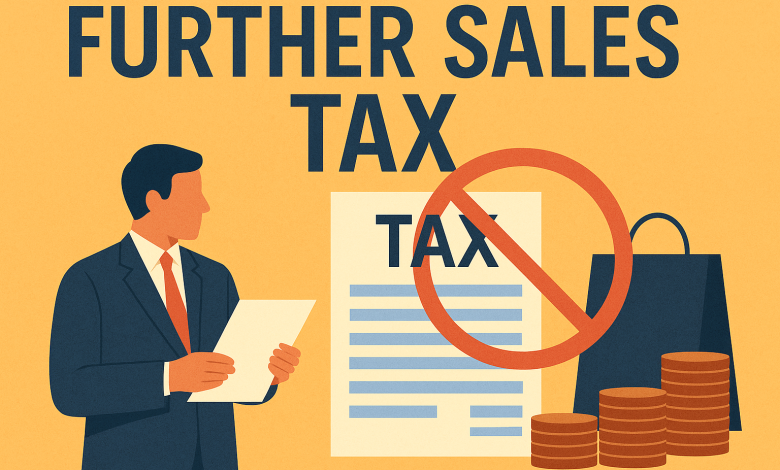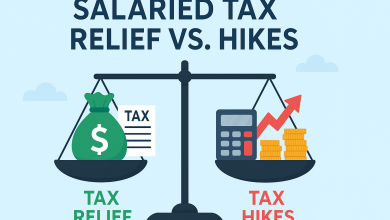FBR Abolishes 4% Further Sales Tax to Formalize Dealers & Retailer in Tax Net

The Federal Board of Revenue (FBR) is preparing to take a bold and strategic step in the upcoming Budget 2025–26. The authority plans to eliminate the 4% “further sales tax” that currently applies to supplies made by registered enterprises to unregistered buyers. Although this measure will lead to a temporary dip in revenue collection, the move is designed to serve a much larger purpose: drawing a vast network of informal businesses into the formal tax system.
Understanding the Background
To appreciate the impact of this decision, it’s essential to understand what “further sales tax” actually means. Back in the Finance Act 2023, FBR enlarged the sales tax net, introducing a surcharge to discourage transactions with businesses that were not officially registered for sales tax. An initial rate of 3% was later increased to 4%, making it more expensive for registered businesses to supply to unregistered entities.
Here’s how the current system works:
- A manufacturer or importer must hold a valid sales tax registration.
- If they sell goods to buyers without registration—or to those who are registered but not compliant—the sale is taxed at an additional 4% rate.
The purpose of this mechanism was straightforward: disincentivize business operations that remain outside formal supervision and compel businesses to register. Yet, despite this, a large number of dealers, wholesalers, and retailers continue to operate informally, effectively evading full compliance.
The FBR’s New Strategy
The upcoming budget’s proposed amendments to the Sales Tax Act aim to eliminate this punitive levy entirely. On paper, this sounds like a tax cut—but in reality, it’s a strategic pivot. By removing the fear of an extra cost, the FBR hopes to make registration a more attractive proposition for businesses currently outside the system.
The rationale behind this strategy unfolds in two key phases:
- Short-Term Pain, Long-Term Gain: Naturally, scrapping the 4% extra levy will initially shrink the FBR’s coffers. Registered suppliers who routinely sell to unregistered buyers will no longer collect this surcharge, meaning an immediate dip in government revenue. However, officials argue this loss is temporary.
- Building a Broader Tax Base: The heart of the strategy lies in conversion. By removing barriers and creating a frictionless path to registration, FBR expects a wave of new registrations from dealers, wholesalers, and retailers who previously operated off the radar.
Who Is Currently in Focus?
At present, the sales tax register in Pakistan contains between 40,000 and 60,000 active taxpayers. This figure includes manufacturers, importers, wholesalers, distributors, and major retailers. However, this masks a much larger informal economy:
- Dealers and Wholesalers: Often family-run, these entities buy from manufacturers and sell to smaller shops without obtaining any registration or producing invoices.
- Retail Outlets: Thousands of small retail shops—particularly in smaller towns and urban peripheries—either don’t register or stay noncompliant.
- Import Chains: Many importers bring in goods but sell through informal networks that avoid documentation, invoices, or formal distribution channels.
How This Fits in the Broader Budget Vision
The Federal Budget 2025–26 emphasizes several objectives:
- Tax Base Expansion: Rather than squeezing more from existing taxpayers, expanding the net is far more efficient.
- Encouraging Formalization: Moving into formal channels opens doors to credit, subsidies, and legal protections.
- Economic Inclusivity: Integrating informal businesses provides a more equitable and regulated marketplace.
Potential Benefits of the Policy
- Increased Tax Compliance: Registered businesses will be obligated to file and remit taxes properly.
- Transparency in Distribution Chains: Formal registration enables better tracking and reduced leakages.
- Support for SME Growth: SMEs gain access to financing, government procurement, and more.
- Better Government Planning: Enhanced data collection leads to improved forecasting and targeted programs.
Challenges & Considerations
- Trust Deficit: Many informal operators are skeptical of FBR’s intentions or procedures.
- Operational Burden: Simplified regimes and tax assistance will be needed to ease transitions.
- Enforcement Complexity: FBR must support and monitor newly registered entities to ensure compliance.
- Sector-Specific Resistance: Some businesses may see even the regular sales tax as a burden.
Lessons from Other Countries
Various countries have introduced simplified tax models to formalize micro and small enterprises:
- India: The Composition Scheme offers reduced compliance for small taxpayers.
- Indonesia: A 0.5% turnover-based tax for SMEs encourages broad participation.
- Mexico: RIF gradually scales tax obligations for new registrants over several years.
Process & Legislative Path
The change requires amending the Sales Tax Act via the Finance Bill 2025–26. Key steps include:
- Repealing the 4% further tax clause (Section 3(1A)).
- Introducing transitional grace periods to support early registrants.
- Launching national awareness campaigns through media and trade groups.
- Upgrading digital portals to simplify registration and return filing.
Projected Revenue Impacts
- Year 1: Initial revenue decline from lost surcharges.
- Year 2–3: Gradual rise in revenue from broader compliance.
- Year 4+: Long-term revenue boost through a broadened base and full formalization.
What to Watch Next
- Final wording of the Finance Bill and its legal implications.
- Execution of taxpayer education and onboarding initiatives.
- Data transparency on registration and compliance trends.
- Reactions from trade bodies and associations.
Looking Forward
If successfully implemented, this policy could mark a transformative shift in Pakistan’s tax structure. By pivoting from punitive surcharges to inclusive onboarding, FBR aims to create a broader, fairer, and more resilient tax base—one that benefits both the state and the businesses it governs.
